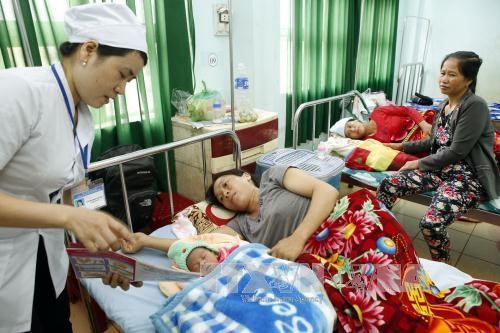 Society
Society

Children and pregnant women lack access to health services in remote, border and island areas, creating a major challenge for the national programme to eliminate the transmission of HIV, hepatitis B and syphilis from mothers to children, Deputy Minister of Health Nguyễn Viết Tiến said in Hà Nội on May 22.
 |
| Mothers and newborns are cared for at Thái Nguyên Province’s General Hospital. — VNA/VNS Photo Dương Ngọc |
HÀ NỘI — Children and pregnant women lack access to health services in remote, border and island areas, creating a major challenge for the national programme to eliminate the transmission of HIV, hepatitis B and syphilis from mothers to children, Deputy Minister of Health Nguyễn Viết Tiến said in Hà Nội on May 22.
He told a consultation workshop on developing a National Action Plan to eliminate the mother-to-child transmission of such diseases in the 2018-30 period, co-organised by Ministry of Health’s Maternal and Child Health Department in collaboration with the World Health Organisation (WHO).
Tiến said that the goal of complete elimination of mother-to-child transmission of these diseases is clear, and the whole health sector is working to make it happen.
"The transmission of these diseases from mother to child causes many consequences, greatly affecting the health of mothers and children," Tiến said.
The department reported that the rate of HIV infection among the country’s two million pregnant women every year is 0.25 per cent.
At the same time, Việt
According to the
A draft on the National Action Plan to eliminate the transmission of HIV, hepatitis B and syphilis from mother to child in the 2018-30 period has been completed by the Ministry of Health.
The plan will focus on key solutions: strengthening communication and finance, innovating new methods of treatment and enhancing the quality of health services such as screening, diagnosis, care and treatment for mothers and children.
At the workshop, participants discussed issues such as antenatal care and pre-testing for disease discovery, interventions for pregnant women, mother-to-child transmission, funding for the implementation of the plan, inter-sector coordination and monitoring.
According to WHO, in the western Pacific Region, every year, about 180,000 people are infected with hepatitis B, 13,000 children are infected with syphilis and 1,400 children are infected with HIV.
These diseases can be prevented through simple and accessible interventions, including pre-testing for pregnant women and vaccination of infants after birth.
Participants at the workshop agreed that in Việt
WHO has developed a framework for the elimination of HIV, hepatitis B and syphilis from mother to child in the Asia-Pacific region for the 2018-30 period and recommended member states develop national action plans to eliminate mother-to-child transmission of the three diseases by 2030. — VNS




